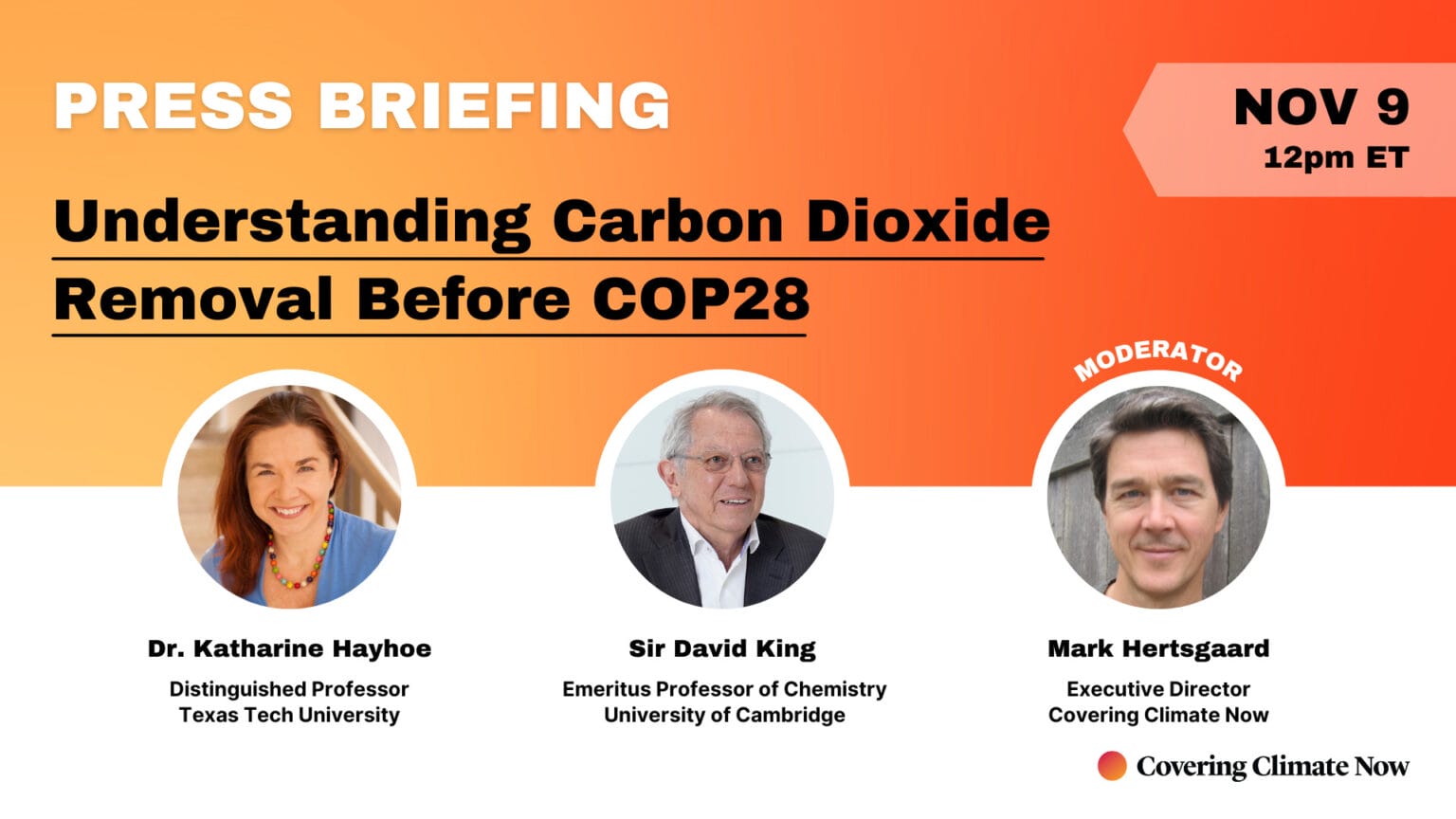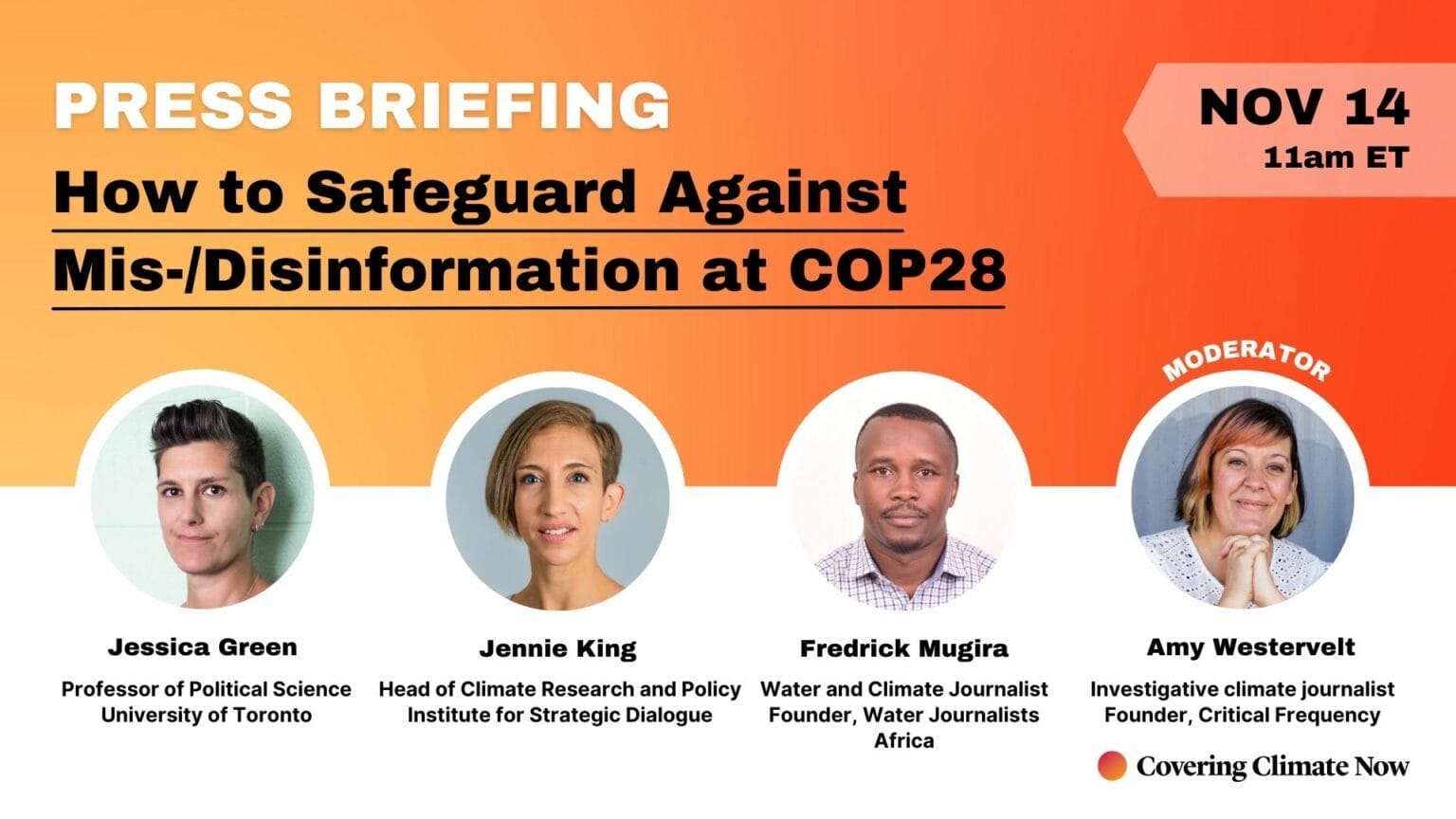“The 1.5-degree limit is only possible if we ultimately stop burning all fossil fuels,” UN Secretary-General António Guterres said last Friday in Dubai. “Not reduce. Not abate. Phaseout — with a clear timeframe aligned with 1.5 degrees C.”
Guterres made those remarks two days before news broke that Sultan Al Jaber, the president of COP28 and CEO of the United Arab Emirates’ state-owned oil company, had mansplained the science of fossil fuel phaseout to former Irish president Mary Robinson last month, preposterously claiming there was no science behind the need to phase out fossil fuels. As COP28 wraps its first week, it’s important for journalists to understand crucial distinctions in the language Guterres and Al Jaber are using — between “phasing out” fossil fuels and “phasing down” their use, and between “abated” and “unabated” use of dirty energy.
To start with, Guterres is correct. The IPCC has previously made clear that humanity needs to cut roughly 50% of greenhouse gas emissions by 2030 and totally phase out fossil fuels by 2050 to avoid the worst climate impacts. As the final clause of Guterres’s remarks stressed, the timing of such a phaseout is crucial. Phasing down fossil fuel use over the next five years can align with science if the result is to cut emissions in half by 2030. But ultimately, such a phasedown has to be a step towards an all-but-total phaseout of fossil fuels by 2050.
Which brings us to the role of “abating” fossil fuels. Al Jaber and other fossil fuel interests are fond of claiming that they are committed to phasing out “unabated” fossil fuels. This often amounts to rhetorical trickery, however. To be clear: “Unabated” refers to fossil energy sources whose emissions are not prevented from reaching and thus overheating the atmosphere — for example, through the use of carbon capture and storage technologies. But the idea that the world could ramp up carbon capture technology sufficiently to allow the continuation, even expansion, of fossil fuel use envisioned by oil and gas interests is “absurd,” Sir David King, a former chief science adviser to the UK government, said during a recent Covering Climate Now press briefing.
Saudi Arabia’s minister has already said his country will not agree to any language in the final text committing to even a phasedown of fossil fuels, much less a phase out. Because the final text of a COP requires a consensus vote, time and again petrostates have been able to stymie real progress. It’s here that civil society — and journalism — can shine: By exposing the deception and sheer obstinacy of big polluters blocking climate action.
In response, former US vice president Al Gore wants to strip the de facto veto power of fossil fuel states at future COPs. Gore told Bloomberg this week that he wants to change COP rules so that a final text can be approved by a 75% supermajority of countries, rather than the current requirement of unanimous consent. Given that more than 100 countries are already on record favoring a fossil fuel phaseout at this COP, this rule change could profoundly alter the balance of power at international climate negotiations — and their eventual outcomes. It would be “extremely difficult” to get such a rule change approved, Gore said, but “the stakes are so high that we have to try every strategy.”
From Us
CCNow at COP28. Are you at the UN climate summit and interested in joining CCNow’s Santiago Sáez and other journalists for a happy hour on Friday evening — or want to be in touch another time? Drop him an email!
- Visit CCNow’s COP28 Resource Hub, which includes our COP28 Reporting Guide, now also available in Spanish.
The Climate Station. Building on the success of our recent newsroom training initiatives, CCNow has launched The Climate Station, a free, customized training program to help local TV stations across the US cover climate stories more effectively. Learn more.
We’re hiring! CCNow is recruiting an Associate Audience Editor (apply by December 8) and a Regional TV Engagement Coordinator (apply by December 15). Learn more.
Noteworthy Stories
Tipping points. Scientists warn that major tipping points for Earth are nearing if global temperature rises 1.5 degrees Celsius above pre-industrial levels, according to a new study. Tipping points “can trigger devastating domino effects, including the loss of whole ecosystems and capacity to grow staple crops, with societal impacts including mass displacement, political instability and financial collapse,” said the University of Exeter’s Global Systems Institute’s Tim Lenton, the study’s lead. By Ajit Niranjan at the Guardian…
Fossil fuel lobbyists. Exxon’s CEO Darren Woods is attending a COP for the first time, pushing for the continued burning of fossil fuels and promoting unproven technologies, such as carbon capture, in an attempt to protect the industry’s business model. A total of 2,456 fossil fuel lobbyists were granted access to this year’s COP, nearly four times more than any previous UN climate summit. By Emily Sanders at ExxonKnews…
$30 trillion. A heavy reliance on carbon capture and storage to achieve net zero by around 2050 will cost at least $30 trillion more than a strategy focused on renewables, energy efficiency, and electrification, according to a new University of Oxford report. The authors added that the technology will likely be required for some hard to abate sectors, such as cement production. By Tannu Jain at Hindustan Times…
Trump’s climate denial. Major news outlets in the US are downplaying or ignoring former president Donald Trump’s dangerous climate denialism and his plans to expand fossil fuels, even though he’s the frontrunner for the Republican nomination. “What Trump is doing… is extraordinary, even among right-wing leaders in peer countries. The radicalism and anti-empiricism of Trump’s position needs to be made central to the reader, not simply reduced to another routine partisan preference that ‘environmentalists say’ may be dangerous,” writes Adam H. Johnson at The Lever…
Threat multiplier. Climate change worsens existing gender inequalities, putting women and girls at higher risk of violence, exploitation, and poverty. Seven women photojournalists document the challenges women and girls face in Nigeria, Brazil, the Philippines, Pakistan, Guatemala, Bangladesh, and Kenya for CNN…
Industry News
Falling short. In the first four days of COP28, corporate broadcast media devoted just 11 minutes of air time to the global climate summit, according to a Media Matters analysis.
- A recent bright spot, however, is a conversation between CNN’s Jake Tapper and PBS’s Miles O’Brien on the danger of fossil fuel influence at the summit, including the problem of greenwashing and promoting carbon capture.
14 ideas. Nearly two years after its founding, the Oxford Climate Journalism Network reflects on what they’ve learned about climate journalism, offering 14 ideas for reporters and newsrooms. We particularly love tip #9 encouraging journalists on all beats to add climate context to stories that are not solely focused on climate change. #ICYMI, check out CCNow’s “Best Practices for Climate Journalism.”
Resources & Events
Fossil fuel B.S. “Lower carbon,” “net zero,” “reliable and affordable energy.” Those great sounding phrases are commonly used by oil companies and can be misleading. NPR breaks it down.
Polling Puerto Rico. The Yale Center for Environmental Communication will hold a webinar on public opinion and engagement on climate change in Puerto Rico. December 8. RSVP.
Global climate protest. The COP28 Coalition is planning a “Global Day of Action for Climate Justice” in nearly 300 cities and towns around the world, including at COP28 in Dubai on December 9. Contact Chadli Sadorra with questions about the Dubai action. Learn more.
Year ahead. Project Drawdown is holding a webinar on the “State of the Climate: Looking back at 2023 and ahead to 2024.” December 13. RSVP.
US grid. World Resources Institute will hold a webinar on “Meeting the Grid Reliability Challenges of the Clean Energy Transition.” December 13. RSVP.
Disasters and temperatures. Climate Central will send out the latest data and resources on billion-dollar disasters in the US and 2023 global temperatures on December 13 and 20. You can sign up to receive these, and ongoing weekly, localized climate reporting resources — in both English and Spanish — or contact Bernadette Woods Placky with any questions.
Via X
Major international news outlets are taking millions of dollars from fossil fuel companies to organize summits and produce advertorial content, according to a new report by DeSmog and Drilled, published in The Nation and The Intercept. Check out this thread on why that’s a problem:
New story co-published by @thenation & @theintercept by @amywestervelt, @Matthew__Green & @JoeyGrostern highlights the problem of news orgs accepting ad $ from #FossilFuel companies, particularly in the creation of advertorial content. https://t.co/39u1XDDBh7 🧵… https://t.co/w66AzE6NiE
— Covering Climate Now (@CoveringClimate) December 6, 2023
Jobs, etc.
Jobs. The Boston Globe is hiring two climate reporters. NPR is looking for a Reflect America Fellow. ProPublica is recruiting a senior editor. NPR-affiliate KBIA and the Missouri School of Journalism are hiring a news director/assistant professional practice professor and an engagement producer.
Diversity fellowship. The Society of Environmental Journalists and The Uproot Project are partnering to offer diversity fellowships to support journalists’ attendance at SEJ’s annual conference in Philadelphia this April. Apply by January 5. Learn more.
Grants. The Fund for Investigative Journalism is offering reporting grants to US-based journalists of up to $10,000 for investigative projects exposing wrongdoings in the public and private sectors. Apply by January 29.
Awards. The Canadian Association of Journalists is accepting submissions for its 2023 awards. Apply by January 19.
Welcome! Brooklyn Eagle/Bluedot Living Brooklyn, Climate Now, The Chronicle of Philanthropy, CommonWealth Magazine (Taiwan), ExxonKnews, FAIR (Fairness & Accuracy In Reporting), Floodlight News, Imagine5 , Latitude Media, Magma, Media is Hope (Japan), MindSite News, Modern Farmer, Netzwerk Klimajournalismus Österreich (Austria), Oil & Gas



